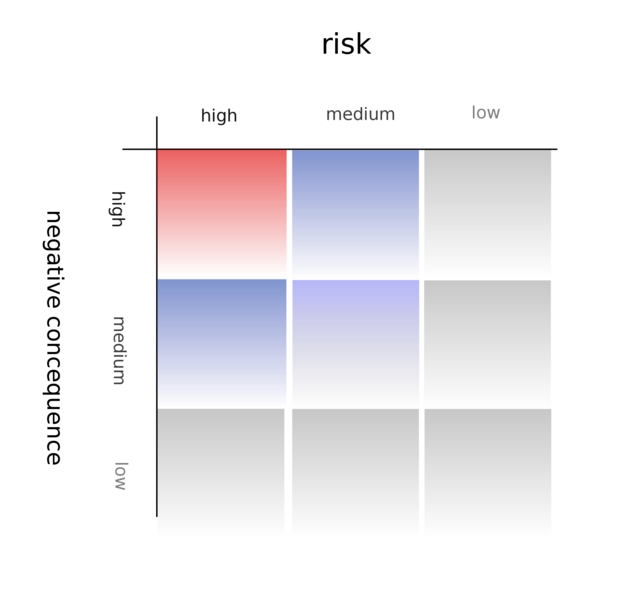An introduction to risk management and deciding on priorities.
A List of Priorities
A list of priorities is not helpful if it is too long. Too long is definitely more than five. Often three is just enough. A list containing 25 priorities out of 125 is certainly some sort of ordering. Still it's not a good list of priorities.
Why?
Try making 25 things at the same time. Or try make a group make 25 things sat the same time.
Take that list of 25 items and select three or fewer. Its hard work, but its that work that really is what is called making priorities.
A good reason not to have more than three priorities is that if you are alone, three things to focus on is a lot (or you are not focusing). If you don´t want to focus, don´t make a list of priorities. The point of a priority is that it is something important and hard enough to require focus. Buying candy is not. Organizing a wedding is.
If you are a group of many members, the same basic thing apply: do you want (or need) to focus? Decide on three things.
A good reason for big organisation to focus is that big organisations exists in order to take on more complex tasks. From that follows that the things to priorities are more complex and of larger scope. Hence, they need the full attention and coordination of the whole organisation.
Risk management
Risk management is about identifying risks and predict the potential negative consequences. Things to consider are:
- the negative consequence if the risk becomes a fact.
- any benefit of taking this risk.
- probability of the risk.
The Tool: Risk Matrix
The Risk Matrix is a tool used to quickly get an overview of the most important and urgent issues to prioritize. In the matrix, you put all the risks you have identified in one of the nine squares. If you have too many risks in the red square, you need to adjust what is considered medium risk and medium negative consequence. You are done when you have a maximum of three to five risks in the red slot.
The risks in the red square is the risk you must focus on until they are under control. You may have figured it out by now: handling risks is very much connected to making priorities. When someone speeds to work in his car, he takes a higher risk of accident and the negative consequence of an accident becomes more negative the higher the speed, and all this is weighted against how urgent it is to get to work.
Risk management is an ongoing activity. With regular interval, you revisit the risk-consequence analysis and updates the risk matrix. If you are successful, some of the prioritized risks will have either lower probability and/or lower negative consequence.
What about medium risks? They are not a priority, that is, they don´t require full attention. Still, they are worth handling so they should be delegate to whatever resources are left in the organization.
Staying Focused - Splitting Your Scout Group?
Let's think about your scout group for a second. There are many things that needs to be handled over a year. Three easy top priorities for a scout group is:
- Recruiting scouts (both hard and high negative consequence if you don't)
- Educate the leaders (both hard and very important)
- Recruit more leaders
Suppose you own a scout house and a scout cottage, then you will also need to focus on:
- house maintenance
- cleaning (indoors and outdoors, believe me, it's often hard to get people to do the important but boring things)
- raising funds for repairs
- rent negotiation
etc
If your scout groups board shall have any chance on success on the three top priorities, they need to stay focused. If you bring in all those other issues, they will probably not stay focused. Yet, the house issues are important enough (especially legally) to require attention from the board. Unless they are handled by another organization focusing on the house alone.
That's why you may consider splitting the scout group into a scout scout group and a house handling group (usually of older scouts).
It's all about being successful by doing the really important things by staying focused.

Comments